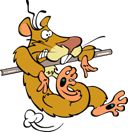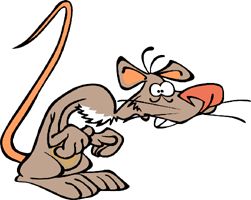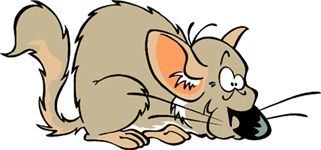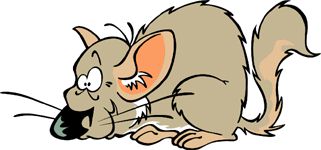Hamsters
Basic Statistics:
- Average lifespan 1.5-3 years.
- Age of puberty 6-8 weeks.
- Gestation (length of pregnancy) 15-18 days.
Adult Size 87-130 g.
General Facts
- Single vs. Multiple: Hamsters should be housed separately, Golden / Syrian hamsters are not social with other hamsters and will frequently fight.
- Dietary requirements: Good quality hamster pellet, fruit, vegetables and grains. Remove any uneaten food every 24 hours.
- Environmental Requirements: Cage with lightweight plastic base, well ventilated. Shredded paper or wood shaving bedding recommended. Hiding/ nesting place essential. Exercise wheel/ ball. Keep away from direct light and heat. Constant fresh water supply in sipper bottle or dish.
- Nocturnal by nature so bright lighting is unnecessary. Sensitive to noise.
- Require some care in handling as can give painful nip (gently lift in cupped hands)
 Common Ailments:
Common Ailments:
- Masses- Pouch impactions, tumours (not to be confused with hip glands and testicles).
- Wet tail- Proliferative ileitis.
- Dental Disease.
- Hibernation below 5 degrees Celcius.
Preventative Medicine:
- 6-12 monthly health checks with your vet and general health check soon after purchase.
- Discourage climbing on the ceiling of cage as fractures commonly result from falls.
Click here to download a Hamsters Care Guide (PDF) »
Rats and Mice
Basic Statistics:
- Average lifespan 2-3 years (rats) and 1-2 years (mice).
- Age at puberty 5-6 weeks.
- Gestation 21-23 days.
- Adult Size: 350-650 g (rats) and 30 g (mice).
General Facts
- Single vs. Multiple: Best kept in groups, however males may fight so female groups usually better.
- Dietary Requirements: A good quality pellet or feed block formulated for rats and mice is ideal. Grains/ mixes should only be fed sparingly. Fresh fruit and vegetables can be added daily. Fresh water should be available on demand usually in a drip feed bottle.
- Environmental Requirements: A good sized wire cage (0.5 x 0.5 metres minimum), with solid floors (plastic not wood) and a number of different levels. Appropriate bedding materials are hardwood shavings and paper products (never cedar or pine shavings as the phenols are toxic to rats and mice). A nest box and safe toys (cardboard tubes are great). Running wheel for mice (no open rings). Hardwood gnawing block for normal teeth wear.

Common Ailments:
- Respiratory Disease- (Mycoplasma Pulmonis, Sendai virus, CAR-cilia associated respiratory virus) can progress to head tilt in rats
- Mammary cancers- Benign forms common in the rat so operable if caught early. Malignant forms are common in mice. Look out for any unusual lumps.
- Mites and lice- cause hair thinning and illness.
- Red tears in rats are a sign of stress so underlying causes should be assessed.
Preventative Medicine:
- Veterinary check shortly after bringing home, then annual Veterinary checks.
- Avoid fish tank style housing as it can cause build-up of irritant ammonia gas which can lead to pneumonia.
- Don’t allow environmental temperature to exceed 28 C as hyperthermia may result (mice and rats lack sweat glands).
Click here to download a Rats Care Guide (PDF) »
Gerbils
Basic Statistics:
 Average lifespan 2-4 years.
Average lifespan 2-4 years.- Age at puberty: 10 weeks
- Gestation 24-26 days.
- Adult Size: 50-60 g at 8 weeks.
- Gestation 24 days.
- Adult Size 80-100 g.
General Facts
- Single vs. Multiple: Best kept in pairs as very sociable- same sex couples usually get along fine.
- Dietary Requirements: A good quality pellet or mix (sunflower seeds are very fattening and should be removed from mixes). Little and often treats such as small pieces of fruit. Clean, fresh water should be available at all times, usually in a drip feed bottle.
- Environmental Requirements: A good sized wire cage with solid floors and different levels or a 10 gallon Aquarium with a wire mesh cover, with different levels. Bedding- Hardwood shavings or paper products (never cedar or pine products as the phenols are toxic to gerbils). Always provide plenty of deep bedding as gerbils love to dig. Hardwood chew blocks or toys. A smooth, clean rock as a lookout spot. An exercise wheel without gaps or openings. An exercise ball for exercise outside the cage (always make sure to tape these shut when in use and keep away from other animals and stairs). Dust bath twice daily.
- Gerbils can be prone to nip if not used to being handled from an early stage.
- Gerbils spend the day dosing. They are nocturnal by nature.
Common Ailments:
- Skin Diseases- Mites (Demodex), facial dermatitis, matted fur, de-gloving of tail, ventral scent gland can become infected.
- Head tilt in geriatrics- aural cholestratoma.
- Epilepsy.
Preventative Medicine:
- Veterinary check soon after bringing home and annual Veterinary checks as necessary.
- Avoid peat / soils as a tunneling medium as they encourage humidity and therefore skin and respiratory conditions
Click here to download a Gerbils Care Guide (PDF) »
Chinchilla
Basic Statistics:
- Average lifespan 8-15 years.
- Age at puberty 4 months.
- Gestation length 111 days +/- 4 days.
- Adult Size 450-900 g.
General Facts
- Single vs. Multiple: Can be kept alone or in same sex pairs.
- Dietary Requirement: Feed good quality chinchilla pellets and plenty of fresh hay (rabbit and guinea pig pellets are alternatives but mixes are not recommended). Treats should be fed sparingly- raisins cut in small pieces are a good treat. Fresh clean water should be readily available, usually using a drip feed bottle.
- Environmental Requirements: Large multilevel, well ventilated cage with various levels and perches. Overheating can be a concern so beware of nearby heat sources or direct sunlight. Chinchillas are nocturnal so need quiet during the day. Bedding- wood shavings (avoid cedar or pine) or paper products. Toys, blocks of hardwood or fruit tree branches. Exercise wheel (15 inch minimum) with a solid running surface. Dust bath- a heavy tip resistant deep dish which can be covered. A specially developed chinchilla dust is best a couple of inches deep. This should be made available intermittently for 10-15 minutes.
- Chinchillas are shy but very affectionate when accustomed to handling. If frightened they can bite , ‘fur slip’ and jet urine at the offender.
Common Ailments:
- Fur slip- A patch of hair may be shed if handled roughly and can take up to 6 months to re-grow.
- Fur ring- clogged fur around the penile tip.

- Pneumonia, especially if high humidity or poor ventilation.
- Heat stroke.
- Dental Disease
- Bloat- Care to make dietary changes gradually.
Preventative Medicine:
- Arrange a Veterinary check soon after taking home and then annual checks.
- Avoid allowing the fur to get damp as this rapidly leads to extensive matting of the coat.
Click here to download a Chinchilla Care Guide (PDF) »
Degu
Basic Statistics:
- Average lifespan 5-8 years.
- Age at puberty 3-4 months.
- Gestation length 90 days.
- Adult Size 170-300 g.
General Facts
- Single vs. Multiple: Sociable animals- should be kept in pairs at least, often single sex pairs from the same litter.
- Dietary Requirements: Good quality rodent block or pellet together with good quality grass or hay. Carrots and vegetables can be given as treats. Sugary foods should be avoided. Constant supply of fresh water usually in a drip bottle/ sipper.
- Environmental Requirements: A large cage with multiple levels (solid floored). Bedding- wood shavings (not cedar based) or paper products. Deep bedding and tunnels. Exercise wheel without rings or gaps.
- Dust Bath- a heavy, tip resistant deep dish, which can be covered. Fruit branches and a nest box.
Common Ailments:
- Diabetes- hence keep sugary treats out of diet and only give fruit and vegetables occasionally.
- Obesity.
- Ear mites.
- Cataracts.
- Diarrhoea.
Preventative Medicine:
- Health check soon after taking home, then annual Veterinary checks.
